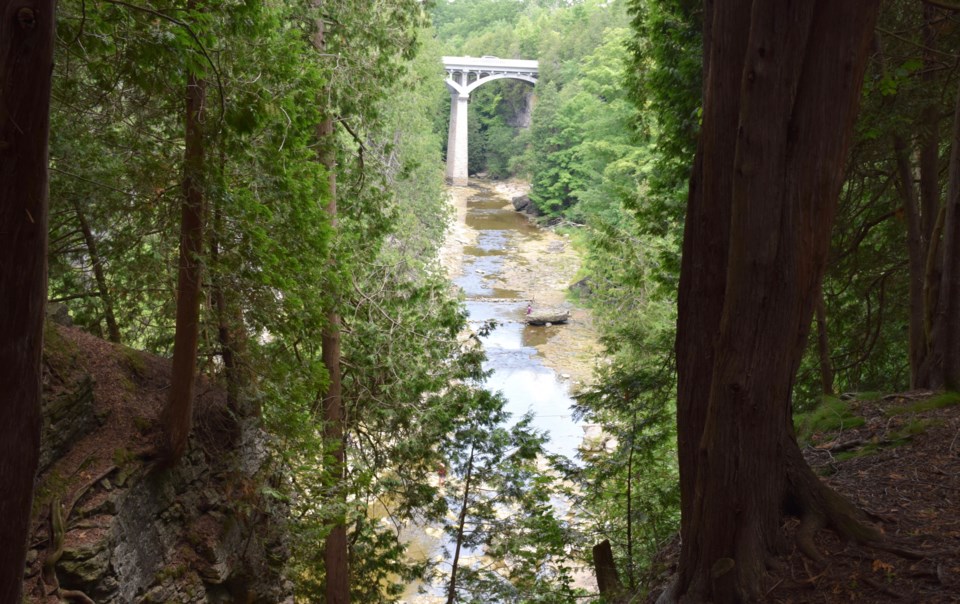Canada has a wealth (if you’ll pardon the pun) of stories and legends about lost treasure.
There are tales of hidden riches associated with Fortress Louisbourg in Cape Breton, the old French colony of Acadia, Long Point on Lake Erie, and the gold rush country of British Columbia. Every province of Atlantic Canada has its yarns about buried pirate loot, said to have been left behind by the likes of Captain Kidd and Henry Morgan. Nova Scotia’s Oak Island is one of the most famous “treasure mystery” sites in the world.
And then there is Elora.
In 1931 – fittingly enough on Halloween – the Toronto Globe published an article about an Elora treasure story. A man named Arthur Shafer, a resident of the village of Salem, told the newspaper that he was looking for “the treasure of the Roberts in the Elora rocks, on the banks of the Irvine River.”
Shafer said, “I’ve heard about it for years. So has everyone else. The legend has it that the treasure was buried by old Roberts, who made a plan (map) of its location and then lost it. Another Indian found the map, dug for the treasure, but did not find it. And now we are trying – and I hope we get it.”
The story – actually a series of stories – Shafer referred to go back to the 18th and 19th centuries, and involve the grant of land along the Grand River the British gave to Joseph Brant and the Six Nations people for their support during the American Revolutionary War. One story says the British gave the Six Nations $25,000 in gold after that war. Another tale says the gold was paid in 1817 in return for the Six Nations’ help in fighting the Americans during the War of 1812.
Yet another version claims the gold was payment for land the Six Nations sold to settlers. The gold was allegedly buried near the mouth of Carroll Creek, a site that eventually became part of Elora Gorge Park – which is administered by the Grand River Conservation Authority.
The Roberts of Shafer’s story was Hugh Roberts, a Welshman who settled near Pilkinton in 1845 and served as reeve for several years. The Six Nations supposedly entrusted him with the location of the treasure horde and got his promise to keep it a secret. Roberts’ son Griffith, an 80-year-old resident
of Elora in 1931, said there was no truth to the story about his father. Why would the Six Nations people tell a stranger about their hidden gold?
Griffith said the story actually began with a man named Joseph (or Thomas) Smith, who had served as a soldier in the War of 1812. He had been given a grant of land near present day London as a reward for his military service, and (so the story goes) traded that land for a rifle and then settled in a log cabin on the north bank of the Grand River, a mile below Elora.
Smith said that an old Indigeneous man had died while visiting Hugh Roberts. Out of gratitude for kindness Roberts had shown him, with his final words he had told Roberts the gold was buried beside the Grand River between an ash and a birch tree at a site between Big Creek and Little Falls. He didn’t say which side of the river.
According to the story, Smith died of burns received in an accidental fire and was buried on the southern outskirts of Elora on the Guelph Road.
Griffith Roberts said Smith’s story was nonsense, but that didn’t stop treasure seekers from searching along the riverbank.
One was Elora’s David Boyle, who would go on to become Canada’s first professional archaeologist and would be somewhat embarrassed to admit he had looked for the treasure.
When the Globe reporter asked Shafer if he had a treasure map, he replied that he did not.
However, he said that a mind-reader with a travelling show that had recently passed through town had told him where the gold was located. He said he wouldn’t disclose any further information.
There is no report of Shafer finding any gold. But would he have told anyone if he had? It is highly unlikely there was ever any buried treasure in the first place. Any money the British government gave to the Six Nations, or which the Nations received for land sales, was deposited in a trust account supervised by government officials.
As with most such tales, the only treasure lay in the imaginations of the yarn-spinners.



